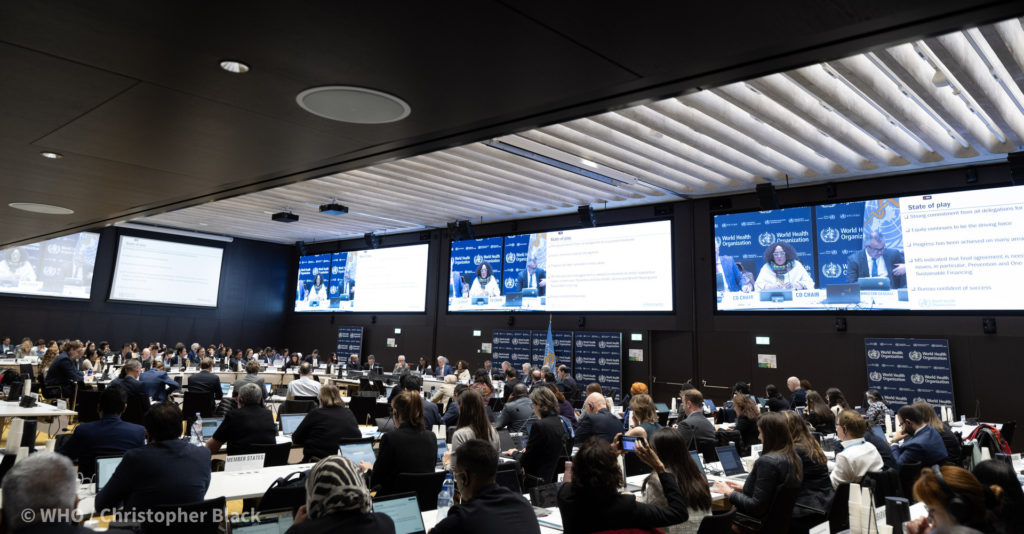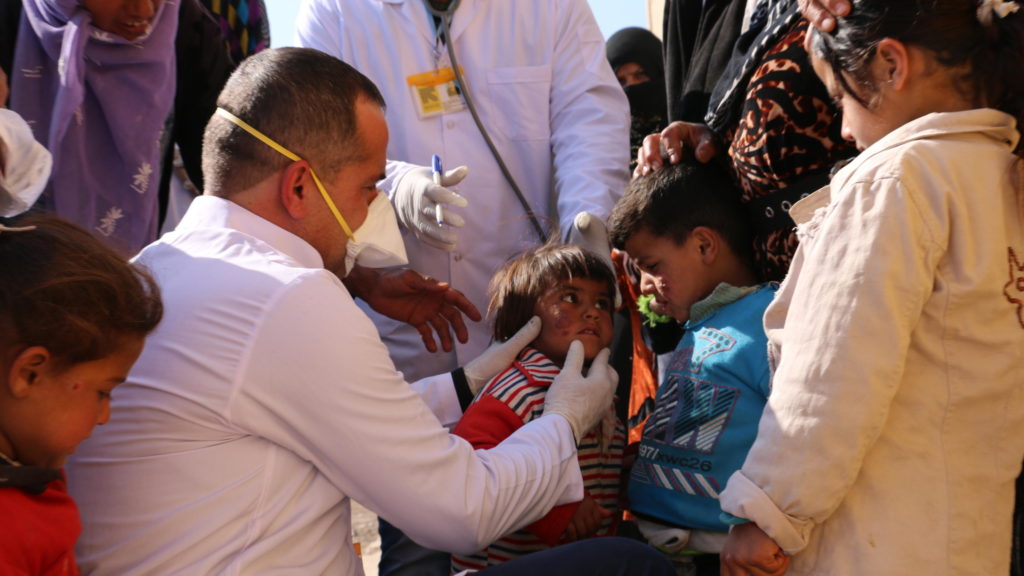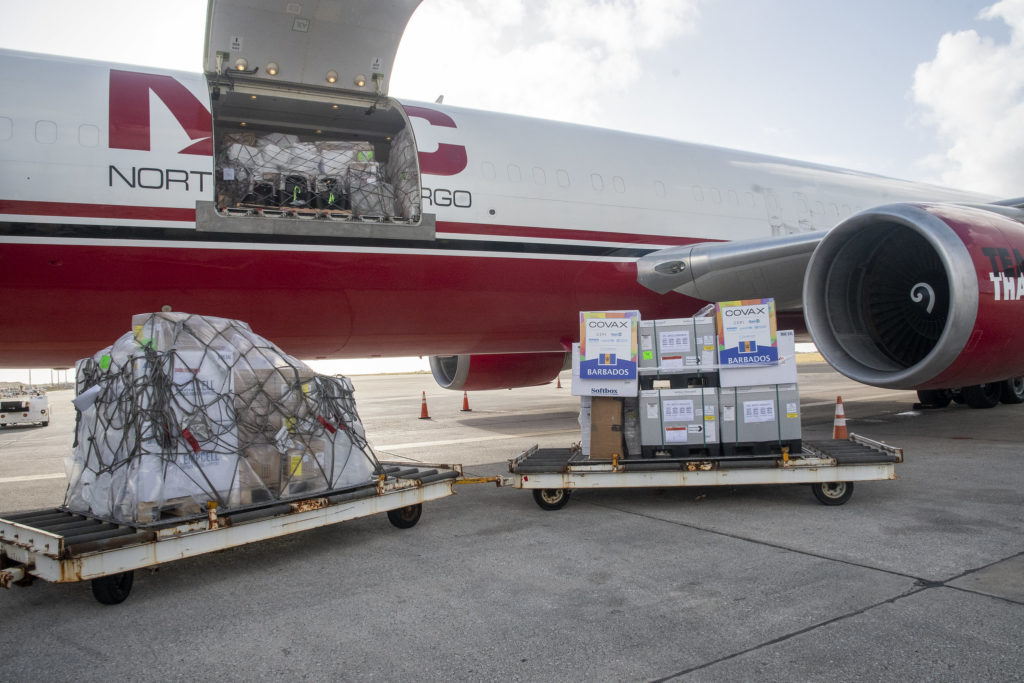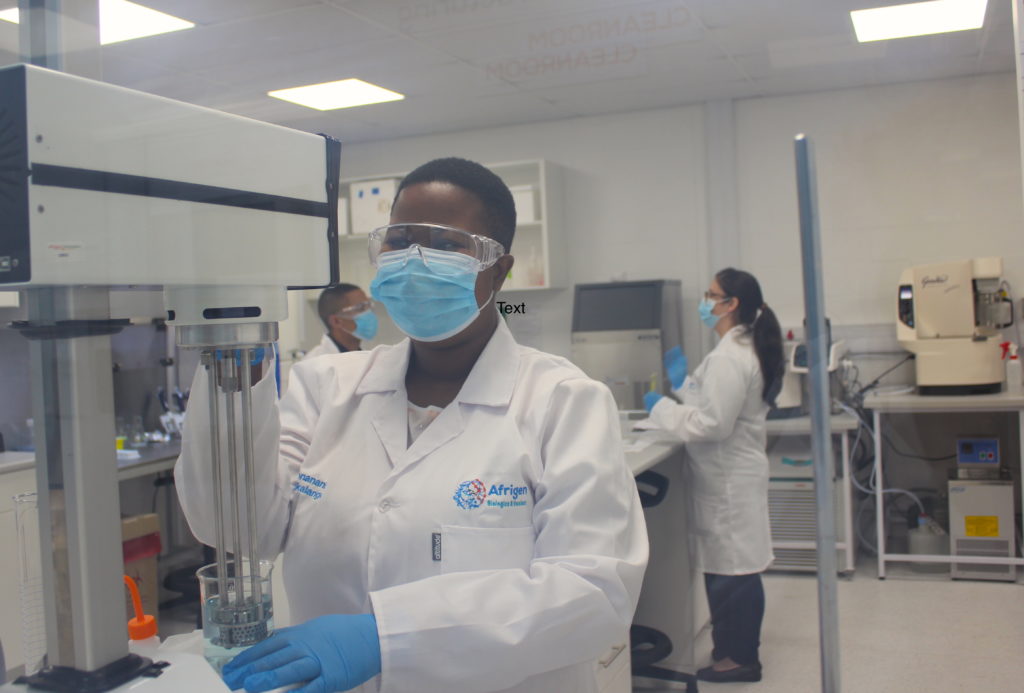From: Health Policy Watch / By Petro Terblanche, Jerome Kim, Rajinder Suri & Padmashree Gehl Sampath, et al.

Sixteen leading scientists and manufacturers involved in vaccine development and production worldwide issue an urgent call for a pandemic accord that can be a ‘win-win for all.’ The full list of authors is available below.
Health misinformation was not invented during COVID-19 but was certainly brought to a higher, more malevolent and destructive pitch during the pandemic. That hostile crusade has since been (mis)directed at two landmark agreements, the Pandemic Prevention, Preparedness and Response Agreement (Pandemic Agreement), and amendments to the International Health Regulations (IHR), that are currently being negotiated by WHO’s 194 member states for approval at the World Health Assembly.
The overarching goal of ensuring that the world will deal more equitably with the next pandemic appears to be elusive as we near the deadline of May 2024 for the close of the negotiations.
Several social media and news outlets have claimed that the WHO is negotiating two instruments that will afford the agency far-reaching powers in case of a future pandemic.
Member-state led talks

While the WHO is the global custodian of human health, the WHO is not negotiating these agreements – the 194 member states are. Aside from being untrue, the false claims undermine the goals of the Pandemic Agreement and its ability to ensure that it remains centered around the key pillars of access, equity, and global health security.
Moreover, these false claims gainsay the grim facts of the COVID-19 pandemic and the lethal consequences that the lack of equitable access to life-saving medical countermeasures imposed on the greater part of the world’s population.
The Pandemic Agreement and the IHR amendments do not grant WHO far-reaching powers and do not compel member states to surrender national sovereign rights.
Rather, they seek to ensure that, by working together, the global community can ensure the health of all. The Pandemic Agreement is an important and empowering step in that direction.
Powerful instrument for for all people
The Pandemic Agreement is a powerful instrument for mankind and, while recognising that the WHO is the internationally-recognised lead agency, it is important to remember that WHO member states initiated these processes, remain the main players in the negotiations, and are themselves, not WHO, responsible for the outcome. The World Health Assembly (WHA), not WHO, decides on the content and adoption of the agreement.
It should be borne in mind that the Pandemic Agreement is NOT written for low- and middle-income countries, but for all countries to secure health security for all peoples – rich and poor. This is critical as pandemics do not stop at country borders, nor put all within a country’s population at similar risk.
Fostering a value system that emphasises equity, as demonstrated through commitments to equal access to vaccines and therapeutics for all people, no matter who they are or where they live is central to such an outcome.
For this to happen, the agreement we need is one that will ensure access by providing a clear pathway to enable access and equity.
The world already has several instruments and treaties, such as the flexibilities under the World Trade Organization’s Trade-related Aspects of Intellectual Property (TRIPS), and the COVID-19 Technology Access Pool, now repositioned as H-TAP (Health Technology Access Programme), which have not yet been used to their full potential.
Implementation roadmap

The agreement’s success will be measured by how it can provide a better roadmap and enable more effective use of complementary agreements and instruments. We must not just discuss notions of technology access, transfer, production and equitable access but move beyond the words on paper to implementation.
There must be clarity on leadership and the need for one entity to lead and govern the implementation of the entire agreement – where health is the focus. WHO, as the directing and coordinating authority in international health work, should be empowered, and supported to effectively execute its mandate with WHO still being accountable to the WHA.
But WHO alone cannot protect the world; there are many other essential players – regional health agencies, governments, public and private agencies, funders, civil society organisations, communities, research, development entities, as well as academic and public health institutions.
Building trust for consensus amongst all these players is complex: it requires a clear view on the barriers to trust.
Moving the needle toward consensus amongst the 194 World Health Assembly states with a few days left to go will require a strong effort to eliminate the fundamental misunderstandings about the Agreement and bring forth its acceptance.
Why support a pandemic agreement?

Why should we join a movement to ensure that a pandemic agreement is agreed to by all governments and is adopted as soon as possible?
The answer is both simple and profound: in the face of the COVID-19 pandemic, people were often afterthoughts, and some countries used the worst pandemic in a century to further their own geopolitical and domestic political agendas rather than to unite to advance life-saving solutions together, effectively, efficiently, equitably, and justly both globally and within their own country.
During the pandemic, it was governments (many elected by the people) that chose – or did not choose –to impose lockdowns to quell waves of COVID-19; it was governments that chose – or did not choose – to impose travel restrictions.
When high-income countries pre-ordered far more vaccine doses than they could ever use, and indeed, millions upon millions of doses were disposed of, rather than being shared with health workers, elderly people, and immune-suppressed patients in lower-income countries when demand was high, it was governments that justified these excesses.
Act-Accelerator and COVAX partners, including the WHO, which works for its 194 member states, did their best to streamline access to vaccines, diagnostics, and therapeutics.
But WHO is only as strong as governments of the member states wish it to be – WHO cannot force governments to do anything.
A win-win for all
At present, there are several issues in the agreement still to be resolved. Higher income countries are worried about their autonomy and pharmaceutical corporations based in those, about profits, while lower-income countries in all regions, including those across Africa, are requiring mechanisms that will prevent gross inequities from recurring.
The pandemic agreement is not designed to be detrimental to the autonomy of nations or the profits of private firms but a win-win for all by preventing gross inequalities in access to vaccines, therapeutics, and diagnostics.
Some of the mechanisms being discussed involve nesting within WHO several time-bound processes that would alert governments when the first signs of a dangerous outbreak are being detected; that would require governments to share information about nascent outbreaks anywhere on the globe; whereby pandemics that threaten all people everywhere result in the equitable sharing of life-saving medical interventions – with industry, researchers, and governments agreeing in advance to a level of essential benefits-sharing that will save lives while fostering scientific innovation.

Central role of technology transfer
Paradoxically, ensuring the spread of technical know-how and manufacturing capacity to lower-income countries, which is central to these outcomes, is a strong area of disagreement amongst WHO’s Member States about the Pandemic Agreement, although the WHO has been leading an effort over the past two years to do just this.
South Africa is at the centre of this shift, and there is real hope that it will change the game for mRNA vaccine production in Africa and the use of other vaccine manufacturing technologies.
A global pandemic agreement that addresses the issue of technical know-how for manufacturing will ensure that the next time around, the global community is prepared ahead of time to accelerate this shift. Ultimately, when governments agree on principles like sharing and equity, it is ordinary people who benefit. At the same time, in the face of conflict and chaos, it is ordinary people who suffer.
A better path to global equity
To be clear, the Pandemic Agreement will not be enacted in isolation. Other established instruments, especially those that govern intellectual property and trade, will support and continue to co-exist working together to enhance access in a synergistic manner.
The agreement is a means to better address equity globally and must be owned by all governments.
We urge all of those who are curious about the Pandemic Agreement and its agreement process to learn more and join millions of others around the world to urge all governments to get the job done, to find a way to bequeath to future generations the sort of pandemic agreement which, will ensure a swifter, fairer response for a better healthier world for all.
Prof Petro Terblanche is managing director of Afrigen Biologics, South Africa, which hosts the WHO’s global mRNA technology vaccine hub.
Dr Jerome Kim is Director General of the International Vaccine Institute, South Korea.
Rajinder Suri is CEO of Developing Countries Vaccine Manufacturers Network, India.
Prof Padmashree Gehl Sampath is CEO of the Africa Pharmaceutical Technology Foundation, Rwanda.
Prof Kiat Ruxrungtham is founder and co-director of the Vaccine Research Center at Chulalongkorn University, Thailand.
Frederik Kristensen is managing director of the Regionalized Vaccine Manufacturing Collaborative and Coalition for Epidemic Preparedness Innovation.
Ramon Rao is CEO of Hilleman Laboratories, Singapore, which translates early discovery of vaccines and biologics for infectious diseases into affordable products with global health impact.
Prof Sarah Gilbert is Saïd Professorship of Vaccinology at Oxford University UK, and co-developed the Oxford-AstraZeneca COVID-19 vaccine.
Prof Glenda Gray is president of the South African Medical Research Council South Africa.
Boitumelo Semete is CEO of the South Africa Health Products Regulatory Agency, South Africa.
Prof Noni MacDonald is professor of paediatrics (infectious diseases) at Dalhousie University in Canada.
Charles Gore is executive director of the Medicines Patent Pool Switzerland.
Dr Amadou Sall is CEO of the Institute Pasteur Dakar in Senegal and Director of the WHO Collaborating Center for Arboviruses and Viral Hemorrhagic Fever.
Prof Cristina Possas is an infectious diseases expert at the Institute of Technology on Immunobiologicals (Bio-Manguinhos) at Fundação Oswaldo Cruz (Fiocruz) in Brazil.
Dr Simon Agwale is CEO of Innovation Biotech (Nigeria and USA).
Image Credits: Chris Black/WHO, UNICEF, International Rescue Committee, PMO Barbados, Kerry Cullinan.

From: The Independent Panel for Pandemic Preparedness and Response
Statement of the Right Honourable Helen Clark
Former Co-Chair
The Independent Panel for Pandemic Preparedness and Response
Opening Segment of the UNGA High-Level Meeting
Pandemic Prevention, Preparedness and Response
20 September 2023, UNHQ.
Excellencies,
Let me congratulate the General Assembly on coming together in this High-Level Meeting on Pandemic Prevention, Preparedness and Response.
Your leadership on these issues is important. You meet knowing that the COVID-19 pandemic has resulted in an estimated 24 million excess deaths, and set back progress on the Sustainable Development Goals. Many countries are still struggling to recover.
A virus we didn’t know four years ago has settled in worldwide at great cost to people and to governments.
The political declaration before you today has to be a catalyst for the change which stops this from ever happening again.
The question is, how urgently can it be built on to bring the transformation which the international system for pandemic preparedness and response requires? Viruses with pandemic potential won’t wait for years for diplomacy to produce results before they strike.
So, where do we need change?
First, on equity. Research and development, and equitable access to diagnostics, vaccines, and treatments, are issues of paramount importance to Member States. Many of us believe that these goods are so crucial to the management of health emergencies that they must be treated as part of the global commons.
There has to be a pre-negotiated and financed end-to-end ecosystem for medical countermeasures. Every region must have the technology, knowledge, and local capacity needed to stop outbreaks when and where they occur. Other essential supplies to safeguard human life must also be accessible. Bottom line: no country should be at the mercy of global markets to protect its citizens.
Second, on finance. The demand for grants from the new Pandemic Fund is vastly outstripping what is available. A global public investment model is needed to gathering the funds to support low- and middle-income countries. That should also apply to surge financing in the event that a pandemic threat emerges and rapid action is needed. Spending billions will save trillions and will protect human life and future progress on the SDGs.
Third, the Geneva processes must be ambitious. Revised International Health Regulations can help speed up detection, reporting, and alert of pathogens of international concern. WHO must be empowered to sound the alarm rapidly, with evidence, and without bureaucracy. There is no time to lose. COVID-19 spread around the entire globe within four months. That cannot be allowed to happen again.
A new pandemic accord can commit countries to strengthen national health systems, surveillance, solidarity, and equity. This is the world’s next opportunity. Please do not miss it.
Fourth, governance. The declaration before you seeks to “Strengthen regional and international cooperation, multilateralism, global solidarity, co-ordination and governance at the highest political levels and across all relevant sectors.” The question is, how will you do this?
Can a leader-level body such as that recommended by the former Independent Panel and others be established? If not now, when?
As a former Prime Minister and a former Minister of Health, I believe that a council of Heads of State and Government is needed to help break the cycle of panic and neglect and sustain political momentum for preparedness and response.
Next year’s Summit of the Future may address the management of complex crises and could present another opportunity for action for ensuring leadership at the highest level.
Fifth: accountability. Independent monitoring of country preparedness is needed to guarantee mutual assurance. Compliance and accountability with international agreements is in every nation’s interest, and is critical to protecting the most vulnerable and marginalised.
Preparedness requires working with communities and addressing misinformation and disinformation – starting now. You cannot build trust in the midst of a crisis.
I leave you with this final thought. Imagine if one of us here, now, were infected with a new, dangerous virus. More of us would become infected this week. We would fly back home to our families and communities, potentially sparking another crisis. Would our countries be ready to manage that outbreak? Would the world?
I am confident that human ingenuity and solidarity can make COVID-19 the last pandemic of such devastation.
But that is a political choice. You have the power to make it.
Thank you.
_________
For more information, contact Christine McNab: +1 416 986 2068; ChristineMcNab@gmail.com
Amid a global shortage of vaccines and a new wave of COVID-19 infections, some countries in Southeast Asia are rushing to develop their own coronavirus shots.
COVID19 Vaccine Tracker – Chulalongkorn University: ChulaCov19
The research team behind the development of a local mRNA Covid-19 vaccine on Monday asked the government to help finance the project
The Phase 1 trial of Thailand’s homegrown mRNA COVID-19 vaccine ChulaCOV-19, suggests the candidate vaccine can help the body elicit
The mRNA vaccine, currently being developed by the Vaccine Research Centre of the Faculty of Medicine of Chulalongkorn University, can stimulate the immune system to produce killer T-cells
The Faculty of Medicine at Bangkok’s Chulalongkorn University has put out a call for healthy volunteers to take part in trials of its Covid-19 mRNA vaccine.
TriLink enables Chula VRC to take its Covid-19 vaccine into a First in Human (FIH) phase 1 clinical trial in Thailand with mRNA
With Covid-19 battering Thailand and the third wave bringing the Sinovac-resistant Delta variant to the forefront of the pandemic,











